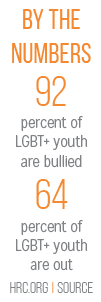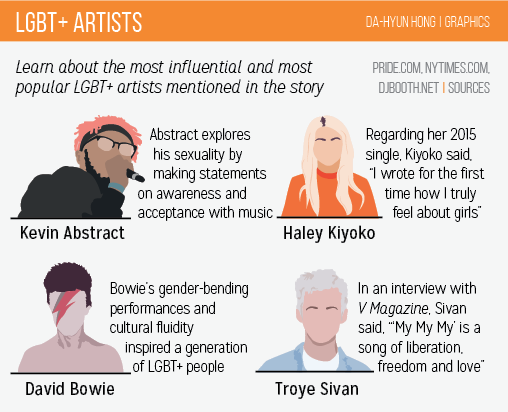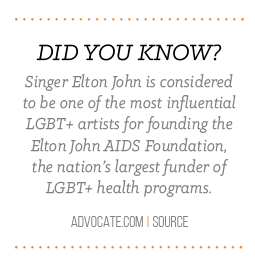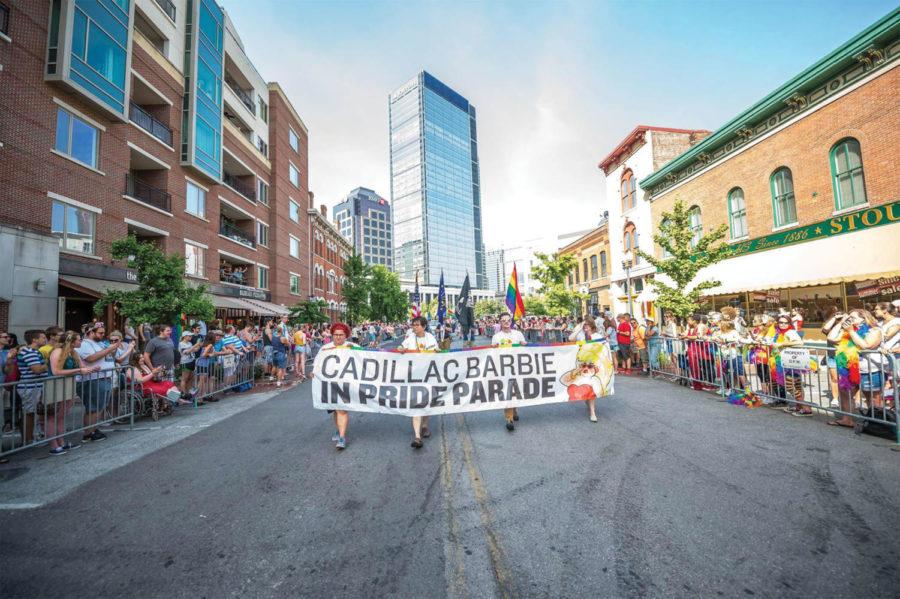The indy Pride Festival will occur on June 9 in downtown Indianapolis, and according to Chris Handberg, executive director of the pride festival, it provides the LGBT+ community a place where they can feel safe, accepted and represented. Events like the pride festival also shed light on the LGBT+ community within pop culture and the media and the importance of representation.
Handberg said big events like the festival provide not only a feeling of solidarity and a sense of family, but they also give the community a place where they can feel recognized.

“We need to celebrate who we are, to not be ashamed of our sexual identity or gender orientation, and we need a place to do that which is safe,” Handberg said. “We still live in a red state where there are hostile attitudes towards LGBT+ people, and this is the one day a year where people come from all over the state and all over the region to celebrate pride with us.”
Kiley Gardner, Gay Straight Alliance (GSA) president and senior, said the history of LGBT+ pride adds to the importance of events like parades and festivals. The Stonewall Riots are considered to be the first pride event because police were raiding a bar that catered to the LGBT+ community and those in the bar fought back. The Pulse nightclub shooting, which happened nearly two years ago in Florida, was another devastating event that adds into the importance of acceptance and tolerance for this community.
“It’s kind of like we went through a time where you couldn’t be openly gay without being arrested, harassed, beaten or even killed,” Gardner said. “So to have a space or just a month in the year where you can be openly gay and march in a parade that celebrates who you are and what you’re proud of, I think that’s really important.”
Sophomore Luke Vreeman, who is attending the pride festival and has attended in the past, said he enjoys pride events because he is able to see people being proud of who they are and being comfortable with themselves despite how much political conflict has surrounded the community in recent years.
“It’s just about people being more accepting, and I feel the event is really helpful in getting more attention to it, and I think the more attention and representation there is, the more accepting people become of themselves and of others,” Vreeman said.

Handberg, who used to work with domestic violence victims, said pride events that feature performances and entertainment centered around the community are also important because LGBT+ people are not oftenrepresented in a positive light within pop culture and the media. This representation is important not only because the community sees themselves reflected in daily life, but also for seeing healthy LGBT+ people and relationships.
“There were no role models for a lot of us growing up of what a gay relationship should look like. There were no role models for what it means to be transgender,” Handberg said. “Because of that and because of the shame that was kind of put on us by different elements of society, we are more at risk for dating abuse, domestic violence and sexual assault.”

Gardner said she listens to LGBT+ artists like Hayley Kiyoko, Troye Sivan and Kevin Abstract. When it comes to musical representation, Gardner said it’s important when people in the community are growing up and learning more about themselves and their sexuality, it helps to have love songs about same sex couples.
“I think right now, in the music scene, with Hayley Kiyoko and Brockhampton coming out with new music, it’s becoming more acceptable, but there’s still obviously a lot of homophobia and we could definitely be better about that,” Gardner said.
Vreeman said he believes mainstream music should feature more flamboyant artists like David Bowie because it can help members of the LGBT+ community come to better accept themselves.
“I think it’s just that we need to stop ignoring LGBT+ artists. There needs to be more representation because I feel a lot of the artistic community, especially in music or musical theatre, is LGBT+ or lives a different lifestyle,” V
reeman said, “but I don’t think there’s that much representation.”
Along with more LGBT+ musicians and members of the music community comes seeing more representation of the LGBT+ community in movies and television. Gardner said with recent movies like “Love, Simon,” people are seeing a more positive perspective of characters attracted to the same sex, but she wishes there were more storylines that did not focus on that part of a character.
“We need to have stories about gay characters who just exist and do the same things as their straight counterparts,” Gardner said. “I know in like sci-fi, there’s been minor gay characters and villains. It’s a start, but I would really like to get to a point where the main character, the main hero is gay, and no one bats an eye.”
Vreeman said a significant amount of representation is present in pop culture and the media, but he likes events like the pride festival because the LGBT+ community is able to go out into the streets and tell everyone who they are and show they’re proud of that.
Vreeman said, “It’s just so much more to see it all culminated into that event. I think if people see things like this, they’ll realize it’s not something you should judge people for, something to be mad about.”
To read a story about transgender students at CHS, click here.


































![AI in films like "The Brutalist" is convenient, but shouldn’t take priority [opinion]](https://hilite.org/wp-content/uploads/2025/02/catherine-cover-1200x471.jpg)









































![Review: “The Immortal Soul Salvage Yard:” A criminally underrated poetry collection [MUSE]](https://hilite.org/wp-content/uploads/2025/03/71cju6TvqmL._AC_UF10001000_QL80_.jpg)
![Review: "Dog Man" is Unapologetically Chaotic [MUSE]](https://hilite.org/wp-content/uploads/2025/03/dogman-1200x700.jpg)
![Review: "Ne Zha 2": The WeChat family reunion I didn’t know I needed [MUSE]](https://hilite.org/wp-content/uploads/2025/03/unnamed-4.png)
![Review in Print: Maripaz Villar brings a delightfully unique style to the world of WEBTOON [MUSE]](https://hilite.org/wp-content/uploads/2023/12/maripazcover-1200x960.jpg)
![Review: “The Sword of Kaigen” is a masterpiece [MUSE]](https://hilite.org/wp-content/uploads/2023/11/Screenshot-2023-11-26-201051.png)
![Review: Gateron Oil Kings, great linear switches, okay price [MUSE]](https://hilite.org/wp-content/uploads/2023/11/Screenshot-2023-11-26-200553.png)
![Review: “A Haunting in Venice” is a significant improvement from other Agatha Christie adaptations [MUSE]](https://hilite.org/wp-content/uploads/2023/11/e7ee2938a6d422669771bce6d8088521.jpg)
![Review: A Thanksgiving story from elementary school, still just as interesting [MUSE]](https://hilite.org/wp-content/uploads/2023/11/Screenshot-2023-11-26-195514-987x1200.png)
![Review: "When I Fly Towards You", cute, uplifting youth drama [MUSE]](https://hilite.org/wp-content/uploads/2023/09/When-I-Fly-Towards-You-Chinese-drama.png)
![Postcards from Muse: Hawaii Travel Diary [MUSE]](https://hilite.org/wp-content/uploads/2023/09/My-project-1-1200x1200.jpg)
![Review: "Ladybug & Cat Noir: The Movie," departure from original show [MUSE]](https://hilite.org/wp-content/uploads/2023/09/Ladybug__Cat_Noir_-_The_Movie_poster.jpg)
![Review in Print: "Hidden Love" is the cute, uplifting drama everyone needs [MUSE]](https://hilite.org/wp-content/uploads/2023/09/hiddenlovecover-e1693597208225-1030x1200.png)
![Review in Print: "Heartstopper" is the heartwarming queer romance we all need [MUSE]](https://hilite.org/wp-content/uploads/2023/08/museheartstoppercover-1200x654.png)




